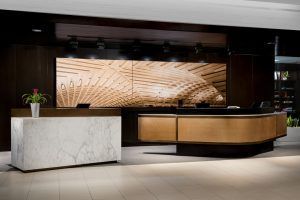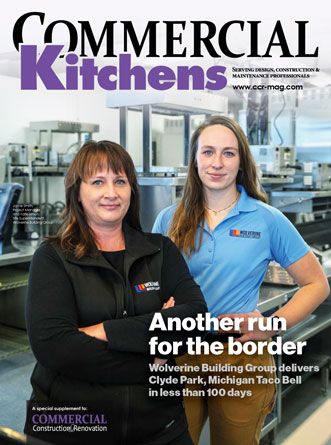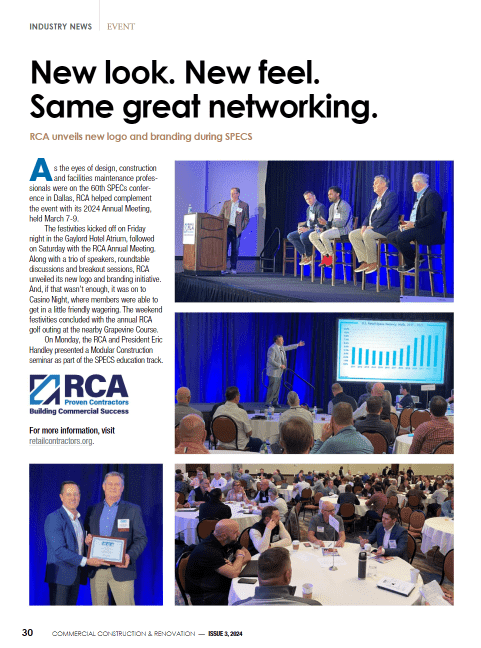 The ongoing pandemic has changed the way everyone walks through life, but it especially has impacted the way people travel. At the onset of COVID-19, hotel brands struggled with both low occupancy, and keeping their guests and valued staff members safe. With increased knowledge of the virus, brands have a better idea of the tactical and functional changes they need to make, but perhaps the more difficult next step is reimagining daily rituals in this new era of travel. In the past five to 10 years, the emergence of the sharing economy and home-share vacation rentals has shifted and reshaped the hospitality industry, driving hotel brands to make deeper connections with guests and leverage their consistency of offerings. Hoteliers rose to the challenge of differentiating themselves from their new competitors. Through both design and marketing, they built a level of trust with guests.
The ongoing pandemic has changed the way everyone walks through life, but it especially has impacted the way people travel. At the onset of COVID-19, hotel brands struggled with both low occupancy, and keeping their guests and valued staff members safe. With increased knowledge of the virus, brands have a better idea of the tactical and functional changes they need to make, but perhaps the more difficult next step is reimagining daily rituals in this new era of travel. In the past five to 10 years, the emergence of the sharing economy and home-share vacation rentals has shifted and reshaped the hospitality industry, driving hotel brands to make deeper connections with guests and leverage their consistency of offerings. Hoteliers rose to the challenge of differentiating themselves from their new competitors. Through both design and marketing, they built a level of trust with guests.
Today, following the outset of COVID-19, consumers will be re-evaluating their travel behavior and lodging providers. Safety, health and evidence-backed messaging will guide decision-making. This is the time for hotel brands to lean into the relationship they have cultivated with guests, their ability to roll-out large-scale programs and leverage brand partnerships. This is a space where reputable hotel brands can provide a level of credibility and responsibility that shared platforms simply cannot.
At the start of the pandemic, there was a sprint to define what the “new clean” looks like. Brands leveraged a combination of visible tactics such as sanitizing stations, graphic seals, partnerships with brands like Lysol, and more to instantly cue clean and comfort guests. Additionally, “invisible” investments including automation and tracking technology were used to create truly resilient environments.
Transparent, proactive communication of these efforts and protocols equally were important to ensure guests felt informed, reassured and confident. This led to a cautious recovery over the summer, where hotels became a safe escape from home isolation. While amenities will continue to develop and evolve into long-term solutions, the next hurdles are the social spaces and guest journey touchpoints. It will be necessary for hotel brands to pivot and think differently about these spaces.
Innovation will immediately impact the guest’s journey. Hotel experiences are highly ritualistic, and each stay is carefully crafted to cater to individual routines. Guests check-in with specific touchpoints and expectations in mind, such as daily workouts and complimentary breakfast buffets. Successful brands will consider their COVID-19 response through the lens of those rituals. We will see brands optimize, amplify, reinvent and even eliminate familiar rituals for guests throughout the journey with careful consideration for how these changes also affect their employees.
 These reframed rituals could be minor, but we may also see brands experiment at a larger scale by allowing guests more visibility and control in their experience. Thinking about these important touchpoints and the service component connected may help get to the root of how hotels can pivot their offerings.
These reframed rituals could be minor, but we may also see brands experiment at a larger scale by allowing guests more visibility and control in their experience. Thinking about these important touchpoints and the service component connected may help get to the root of how hotels can pivot their offerings.
Support on-the-go
Whether it is a post-pandemic guest leery of germs or a business traveler late to a meeting, hotel brands should embrace this on-the-go mentality that so many consumers embody. Interior and exterior pickup windows are familiar to consumers and a good example of how hoteliers can support on-the-go snacks and meals. Hotels can elevate their coffee offerings and provide a fast and secure transaction, removing the barrier for guests to make that secondary stop at Starbucks.
Allowing guests to “call down” to place their order for pickup may be the new room service. For focused service properties that typically include a self-service coffee offering, this may pose a more difficult challenge, but perhaps this could manifest in “make your own” packets to go alongside pre-poured cups of black coffee. Technology can be a powerful support system as well. Beyond the reservation, technology can streamline amenities at the guest’s convenience, create ease in contactless services and offer touches of hospitality anytime, anywhere.
Take it outside
The penchant for fresh air will not fade post-pandemic. Hotels should consider investing in larger outdoor or four-season spaces for guests to relax and unwind. From fireside s’mores to cornhole tournaments, these hubs of connection will become the new crown jewel that should be positioned to attract guests.
Investing in outdoor seating and heating elements that extend the usability of these exterior spaces will be critical to making a better connection to the interior public spaces. Also, hotels should consider patios and terraces an extension of the lobby—multi-functional seating, available power/plug-in capability and transitioning dayparts are table stakes in the public space. Some hotels, particularly those in an urban setting, could easily transform rooftop bars, which generally are closed at night, into an auxiliary public space for safer gatherings.
Beyond the reservation, technology can streamline amenities at the guest’s convenience, create ease in contactless services and offer touches of hospitality anytime, anywhere.
A room for every guest
Traditionally, hotels cater to the overnight guest, making the hotel the bookend of a traveler’s day. While this may not change for the majority of a hotel’s occupancy, there is an opportunity to reach out to provide specific daytime services. Offering private offices, co-working spaces or Zoom suites with minimal adjustments to the guest room allows hotels to have a flexible offering and move some public space tasks to a safer, private environment.
Whether it is an opportunity for residents to get out of the house for a few hours or an add-on offering to overnight guests, re-thinking how guestrooms are used could potentially be the revenue generator of the future.
 The new local
The new local
Redefining what it means to be “local” will continue to be a priority, as people feel more loyal to their communities and businesses than ever before. International brands also may explore how to connect various properties as COVID-19 has launched a sense of global camaraderie that will continue to drive guest values.
With air travel out of reach and considered risky by many consumers, road trips and staycations are back in a big way. Now that hotels may have more local visitors with access to transportation, there is an opportunity for those destinations to connect with guests differently.
For those in-town visitors, hotels could curate “best-of” localized packages—specialty local coffee, a croissant from the best bakery down the street, craft beers on tap, etc. It is important that hotels not get caught in generic or expected recommendations because these guests will know. For road trippers, there could be recommendations for where to stop on the way home or on the way to their next destination, those local must-sees—from the funky roadside attraction to the best thrift shop.
With air travel out of reach and considered risky by many consumers, road trips and staycations are back in a big way.
Also, getting outside will be even more important—rather than restaurant recommendation—guests may be looking for the best hiking trails or scenic overlooks. Hotel team members have the opportunity to share their city, from a fresh lens.
While many of these initiatives may seem to strip back amenities or services, we can’t forget that the spirit of hospitality itself must continue to be the driving force of hotels. The best brands surely will implement solutions that communicate cleanliness—but they also will empower their employees to keep a welcoming, concierge mindset at the center of all interactions. Finding new ways to integrate first-class service, personal connections and unexpected moments of delight will elevate these new-to-the-world rituals.
As we continue to evaluate how the pandemic will influence the hospitality sector into the future, we will see hotel properties innovate and reinvent rituals beyond responding to the current climate. The sharing economy undoubtedly transformed consumer expectations and pushed the hotel industry to develop authentically localized and highly individualized lodging experiences. Those benchmarks will not go away. Hotel brands have a unique opportunity to prioritize guest rituals, innovate the experience, and continue to keep hospitality at the core of all they do.
_____________________________________________________________
Rachael Leson is Director Interior Design, Hospitality at NELSON Worldwide.







 The 2024 virtual Men’s Round Table will be held Q4, 2024, date TBD.
The 2024 virtual Men’s Round Table will be held Q4, 2024, date TBD.











